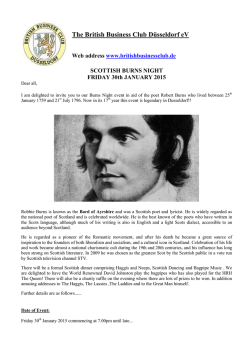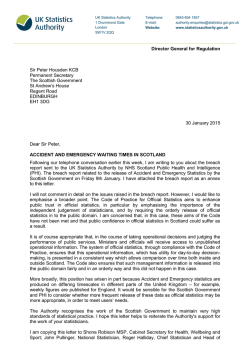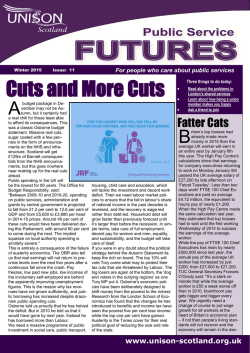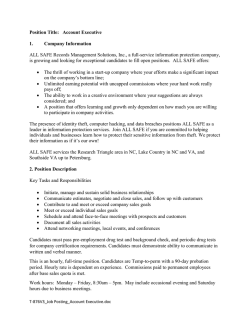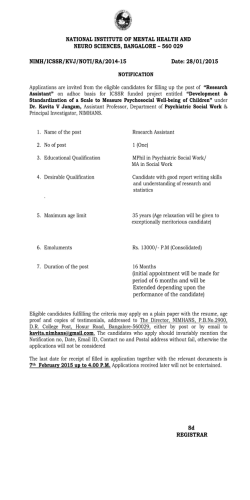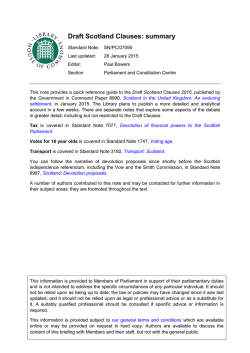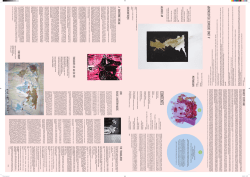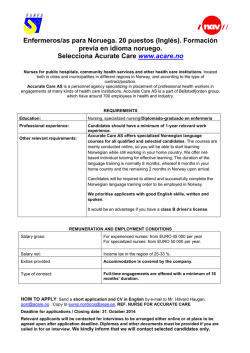
All Presentations
Scottish Studies Award Support Network Event th 18 May 2015 Welcome Robert Quinn (Head of Service) Liz McLashan (Senior EV) Entries increasing – positive Issue with candidates completing Award advice re entering Scottish Context Units Encourage Centres re advantages of flexible Award Code/Level 2013/14 Entries 2013/14 Awards G176/42 -2014/5* Entries 2014/5* Awards 238 GG5X/43 47 4 71 3 GG64/44 401 68 692 86 GG65/45 258 93 323 50 G171 /46 9 Evidence from Centres needs to demonstrate how candidates have broadened their knowledge of Scotland Product/Activity often proves to be less important than process of research Centres should document process – through Assessor Checklist comments or candidates logbook Centres generally had clear understanding of national standard Variety of activities being encouraged – often dependent on candidate skills Evidence of aims, sources and level of support needs to be provided by Centres Internal verification is important – both to ensure standards are met – and to train staff in standards expected Use of language directly from the Assessment Standards is helpful Types of product can vary widely – use of photographic evidence/video footage of performance/logbooks/assessment grids with teacher comment/evidence of reflection through interview – support assessment judgements Where candidates work through a unit of work – can demonstrate that knowledge is broadened through process rather than just the activity – candidate response can determine level of understanding – and hence assessment judgements Complete evidence required for verification Indicate level of support given to individual candidates Centres advised to use Candidate and Assessor checklists Candidates are required to have learned about their Scottish Focus Sources and Resources! Guard against lifting from sources – candidates own wording is essential Possible to gain higher level – evidence of reflection/additional analysis Centres which have chosen a March Completion deadline are eligible for verification Visiting Verification being considered Centres pick up benefit from direct advice Contributing units are covered in other courses – ensure that “with a Scottish Context” codes are used For ALL contributing units/different levels encourage Depts to teach/assess in a Scottish context Be creative – in PSE? – an extra in English or History? – in Core RME? – as IDL? – in S6 study time? – with SfL? – with SLT? – with S3 at end of BGE? Much of work can be done individually and independently – not necessarily in school – tutor support? part of Assertive mentoring? Support Visits can be requested by Centres – cost involved Prior Verification service available [email protected] – give a contact number Maria Antelmi Isobel Mair School Scottish Studies National 2 Learning about Scotland 1.1 • • • • Select an aspect of Scotland you want to learn about. Mind maps Research a few subjects Presentations Guidance Learning about Scotland Robert Burns • Research – who was he, when did he live, what did he do…………….? you tube animation • Quizzes in class online • Visit to Ayr Robert Burns • Listened to and watched clips of poems and songs you tube • Chose 3-4 poems and looked at one or two verses more in depth • Paired up and learned alternate lines of a verse • Presented to class and talked about meaning of the poem • How do we celebrate his life and work? Robert Burns 1.2 Select an activity that will help you develop this knowledge. Robert Burns • Burns Supper what happens order of events types of food poems and songs Burns Supper 1.3 Identify the main steps that you will follow to complete the activity. • Organise identify the main steps assign tasks/actions • invites • recipes • shopping lists • decorations • music • create a quiz Burns Supper - presentation Burns Supper - quiz Burns Supper – Smart Response Burns Supper – address to the haggis Burns Supper - recitals Language and Literature • Understanding language with a Scottish context: • Reading poems and listening to songs A dug, a dug – Clicker 6 Ally Bally The Proclaimers The Family Ness Super Gran Language and Literature • The Eejits (The Twits) • Listening to the original on You Tube • Listening and reading the Scottish version Language and Literature • • • • • Highlighting new words Word of the day Using Scots words in class Wall displays Homework Language and Literature Language and Literature – differentiating for CfE Language and Literature – differentiating for CfE • a dug, a dug Language and Literature – differentiating for CfE Arts and Culture • Contributing to a performance event with a Scottish context: interest in superheroes enjoyed Super Gran wanted to make their own film Arts and Culture • Wrote the script together • Written around issues that were important to the pupils bullying • Informed through the language in The Eejits Marjorie Kerr and Nicole Tonner Grove Academy SCOTTISH STUDIES At Grove Academy, Dundee MY BACKGROUND Marjorie Kerr Principal Teacher of Geography, Grove Academy Social Studies Development Officer, Education Scotland Acting DHT, Grove Academy SCHOOL BACKGROUND • 1,246 pupils • BGE for all pupils in S1 and S2; some choice in S3 • Pupils study for six N4/N5 subjects in S4; five subjects in S5 • Studying for mostly ‘new’ Highers in 2014-15 • Large cohort of S6 pupils INTRODUCING SCOTTISH STUDIES TO S3 •S3 - had already tried an IDL period per week but parked after HMIe visit in 2012 •Period still exists in timetable - shared between English and Maths (30 period week) •Moving delivery •IDL to 33 period week in 2016 so more scope for Working Group willing to give Scottish Studies a ‘go’ •English Department introducing Scots Language so keen to do Scottish Studies too. •PT English very much on board THE REALITY •SLT in favour. Given the go ahead. •IDL Working group to take timetabled classes •Sorted out classes •Ready to start then hit by absence, work overload •One class going to be trialled this term •Introduce in August 2015 INTRODUCING SCOTTISH STUDIES TO S6 • AH Music students •IDL Working Group mentored individual students THE REALITY •S6 really successful •In course choice booklet for next session •NQT presented to Guidance Team and S5 classes to inform them about it •Timetabled option within Skills column on course choice matrix •Speak to whole staff about ‘with a Scottish context’ Units OTHER SLT ISSUES •Budget •Photocopying •Resources •Access •Staff - purchase and storage to technology willingness to participate KEY TO SUCCESS •Team •SLT •PT work member English •Enthusiastic NQT - Nicole Jacqueline Millar Dalkeith High School Scottish Studies Award S4 Core RME The versatility of the awards: (Using a core subject at different levels with a whole year group) Jacqueline Millar, Dalkeith High School Investigating Religion & Belief with a Scottish Context “The study of a topic involving religion or religious belief which has contemporary or historical relevance in Scotland.” We chose Euthanasia Other possible topics include: The general aim of this Unit is to reflect on a topic involving religion or religious belief which has a contemporary or historical relevance in Scotland Learners who complete this Unit will be able to: 1. Develop knowledge and understanding of a topic involving religion or religious belief 2. Reflect on their faith or values in response to the topic The versatility of the awards We covered the following to make sure our topic, euthanasia, had a Scottish context: - Hospices in Scotland: Marie Curie Hospice in Edinburgh, St Columba’s Hospice Edinburgh - End of Life Assistance (Scotland) Bill, September 2010 - Margo MacDonald - Christian view: Roman Catholic & Church of Scotland - Looking at the laws in Switzerland and thinking about what restrictions/rules to consider if Scotland did legalise euthanasia - Use of up to date statistics Outcome 1: Develop knowledge & understanding of a topic involving religion or religious belief by: At all levels they have to: National 5: 1.1 a topic involving religion or religious belief, - Choosing Outline the chosen topic with minimum support - Outline religious belief relevant to the topic 1.2 Explaining the topic, in detailed terms and referring to relevant abstract ideas Nat 3 is the and above in basica religious terms belief or religious 1.3 Identifying explaining viewpoint to the chosen topic, in detailed Nat 4 is relevant the above in straightforward terms terms and referring to relevant theoretical or abstract ideas. Nat 5 is the above in detail with the addition of 1.4 Analysing and explaining relevant source other outcomes: material Encouraging Reflection • The Unit Assessment Support materials are very useful: they have outlines for what you can do for each level. • We used the tables within this to create a reflection booklet for them to update during the course and this meets all requirements for outcome 2. Pushing Nat 5 candidates We have used a variety of approaches to ensure that the National 5 candidates are challenged enough in order to meet the requirements for all areas in Outcome 1. Assessments For National 3: We gave an option of either creating a presentation on the topic or an assessment that was question and answer based (Pupils given the success criteria 2 weeks before so that they knew what was expected of them) Assessments For National 4 We gave them an option of creating a presentation or doing a mind map of all the relevant areas linked to the topic. (Pupils given the success criteria 2 weeks before so that they knew what was expected of them) Assessments For National 5 We gave them an essay to write on the topic. (Pupils were given the success criteria 2 weeks before so that they knew what was expected of them) Assessments • Our assessments had a focus on Scotland too, the focus being: “Scotland should legalise Euthanasia”. How far do you agree with this statement? Doing part of the Scottish Studies Award in Core RME: Make sure it is a topic pupils will be interested in. Encourage reflection throughout Push the National 5 candidates Support the National 3 pupils, give them other tasks when the demand of the topic/task is too difficult. Make it relevant to Scotland Nicola Daniel Broughton High School and EV SSA - Meeting the Standard for Level 6 Nicola Daniel External Verifier / CL English Broughton High School, Edinburgh All learners must complete the mandatory Scottish Studies: Scotland in Focus (SCQF level 6) Unit. Scottish Studies Award at Level 6 They will also complete three Units from at least two of the following Groups: Group 1 Language and Literature Group 2 Society and Environment Group 3 Arts and Culture Group 4 Business, Industry and Employment There are a number of subject areas within each of these groups. Learners can select only one Unit from any individual subject area within a group. Whichever Units are chosen, these must be delivered and assessed in a Scottish context (and the unit codes are different for these) http://www.sqa.org.uk/sqa/files_ccc/ASScotStudSCQF6.pdf Units can come from: Languages Society and Environment Arts and Culture Business, Industry, Employment Scots Language Religion, Belief and Values Media Business Management Gaelic Geography Art and Design Care Gaidhlig Applied Science Dance Engineering Science English Environ. Science Drama Economics HFT Music Travel and Tourism Law Modern Studies History Candidate Brief: Candidates will: plan and complete an activity that will help them to learn about an aspect of Scotland than is of interest to them The Scotland in Focus Unit finding out about eg: a famous Scottish person, place or invention; Scottish music, art, literature or architecture; Scottish communities at home or abroad; people, circumstances or events that have influenced Scottish culture analyse what they have found out while they were completing the activity communicate this effectively and in detail. evaluate the process they have followed and the effectiveness of their chosen method of communication. Planning/ Completing the Activity Candidates must decide: which two aspects of Scotland they want to learn about - these will be their aims throughout the Unit what they will do to in order to learn about these aspect of Scotland How they will communicate what they have learned On at least 3 sources of information they will use the resources they will need, to complete the activity. Candidates will then: complete the activity, focusing on the specific aspects of Scotland chosen. identify in detail what they have learned about these aspects of Scotland communicate this effectively and in detail Evaluate the processes they followed and the effectiveness of their method of communication. Candidates could have: produced a report, booklet or on-line web-page which contains all the information about what they have learned Identifying and Communica ting Your Findings delivered an electronic presentation with slides and speaker’s notes to show clearly what they have learned put on a performance and kept a workbook or log of what they learned as they planned and developed the performance created art or craft work and kept notes about what they have learned as they planned and created it can use the Candidate Evidence Checklist to check that they have all the evidence needed Teachers will confirm any part of the activity he or she has observed, if necessary and that all the evidence has been the candidate’s own work. Outcome 1 Learners will: plan and complete an activity that has a Scottish focus by Outcomes and Assessment Standards 1.1 identifying aims in relation to broadening, and adding depth to, their knowledge of Scotland 1.2 identifying an activity that will help them to achieve these aims 1.3 identifying detailed sources of information and the resources required to complete the activity 1.4 researching and selecting detailed information which is of relevance to their aims, using the sources they have identified 1.5 using this information and the resources to complete the activity in a way that helps them to achieve their aims 1.6 working independently throughout Not only broadening knowledge but adding more depth: • Widening their learning • Learning about the new topic in detail Progression from Level 5 Detailed sources required Selecting detailed information New for level 6: candidates are expected to work independently throughout Outcome 2 Learners will: Outcomes and Assessment Standards Reflect on what they have learned about their Scottish focus during the activity by 2.1 analysing in depth what they have learned about their Scottish focus 2.2 communicating what they have learned effectively and in detail 2.3 evaluating the process they have followed and the effectiveness of their chosen method of communication The depth of content you would expect from a candidate at Higher level Progression from Level 5 Depth of analysis you would expect from a candidate who is sitting Higher. New elements: Evaluate the process they undertook for researching and communicating. Evaluate how effective their chosen method of communication has been. Depth of Analysis: a short extract During the process of writing a play about the Scottish Witch hunts of 1590, I feel I have gained valuable insight into an important period of Scottish history not often discussed. It is a period of history we have perhaps suppressed from memory due to the horrific acts of violence involved - acts carried out due to ignorance, fear, and religious prejudice. From my research, I learned that the witch hunts came about due to a number of religious and political tensions at the time. After the reformation in 1560, the Church of Scotland was keen to establish its authority and purity as a Protestant institution and worked to inspire an almost puritanical devotion to the Church amongst the populace. This led to an atmosphere of suspicion and mistrust within Scotland, as people were convinced dark forces were working against them to undermine their faith. Amidst all this, King James VI, ruler of Scotland at the time, had his own fixation concerning supernatural forces. After his ship was almost destroyed on a voyage back from Denmark, he began to suspect witchcraft had been used against him. This paranoia eventually led him to sanction a massive witch hunt across East Lothian, encompassing many towns and villages such as Tranent and Prestonpans… Evaluation can be done orally (as part of a learning conversation) or in writing Candidates could evaluate: Evaluation • How effectively their sources helped them how they have deepened and broadened their knowledge of Scotland • the importance of this new knowledge – its impact on Scotland, its relevance past, present or future, the impact it has had on the candidate • how effective their method of research had been • complete their aims • their chosen method of communication/ the activity chosen • how well they completed their activity • the process/standard of their communication • how independently they worked Progression acrossLevel levels Level 4 5 Level 3 Level 6 Aim One – Agreed with teacher One – Chosen from selection Two – Identified independently Two – Identified independently Sources Two – Agreed with teacher Two – Chosen from selection Three Identified independently Three – Identified independently Support Structured support Supported with advice Minimal support Independent throughout Communicating Findings Identify what you have learned Identify in some detail what you have learned Analyse what you have learned Analyse in depth Evaluation Communication Level Basic level of Clear communication communication Evaluate the process and effectiveness of your communication Effective communication Effective communication Detailed Scottish Studies Award Webpage link: http://www.sqa.org.uk/sqa/64329.html
© Copyright 2026
